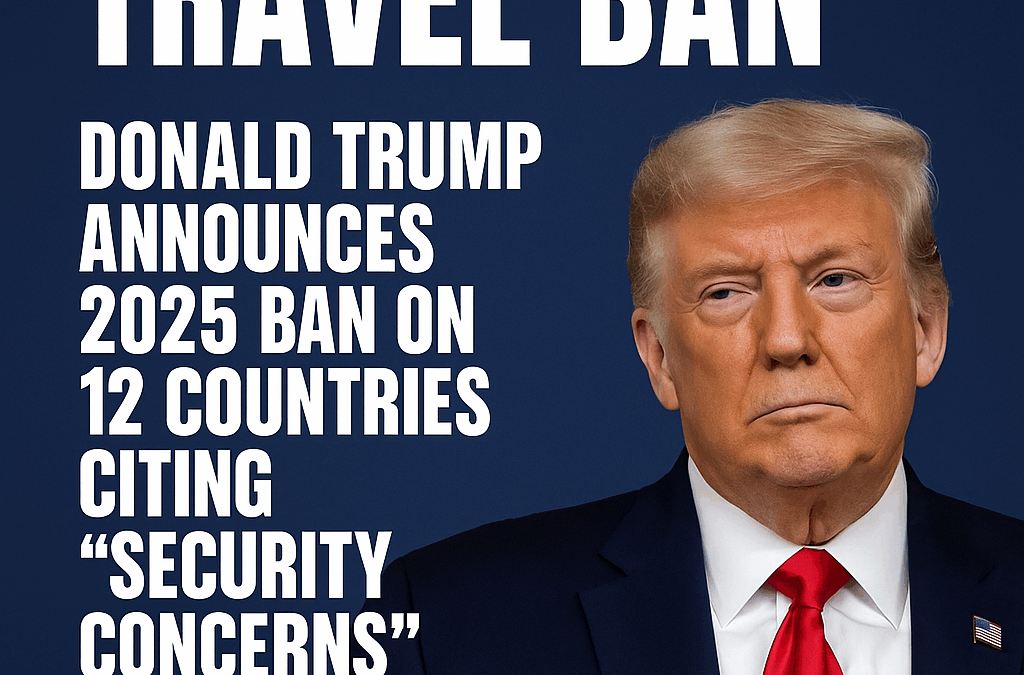
by Soniya Basu | Jun 5, 2025 | 2025 Changes
Restrictions also tighten for 7 more nations under the new executive order
In a move that sparks global concern and intense political debate, Donald Trump signs a new executive order on Thursday, June 5, 2025, enforcing a sweeping Trump 2025 travel ban targeting 12 countries and placing partial restrictions on 7 others.
The order—announced in a televised statement and on official White House social channels—comes after a violent incident in Boulder, Colorado, allegedly involving an undocumented immigrant. Trump says the ban is necessary to “protect national security” and tighten immigration screening.
🌍 Countries Affected by the Trump 2025 Travel Ban
Citizens from the following countries are barred from entering the United States under any visa type:
- Afghanistan
- Myanmar
- Iran
- Chad
- Republic of the Congo
- Equatorial Guinea
- Eritrea
- Haiti
- Libya
- Somalia
- Sudan
- Yemen
This includes students, tourists, workers, and family visitors—regardless of whether they have valid documents.
➡️ Read: Flying from a UK Airport in 2025: What to Expect
🚫 Partial Restrictions Under the Trump 2025 Travel Ban
In addition, 7 more countries face targeted restrictions based on overstay rates and “non-cooperation” with U.S. enforcement:
- Burundi
- Cuba
- Laos
- Sierra Leone
- Togo
- Turkmenistan
- Venezuela
These countries still have access to some visa categories, but the process becomes significantly more complex and selective.
➡️ Planning to move abroad? Check out our UK eVisa guide for Indian travelers
💬 Trump’s Justification for the 2025 Travel Ban
Speaking from Washington, Trump justifies the policy:
“We cannot have open migration from any country where we cannot safely and reliably vet and screen… That is why today I am signing a new executive order.”
He claims the policy is designed to prevent terrorism and undocumented immigration—though critics say it repeats the discriminatory tone of his 2017 “Ban.”
✈️ Who This Affects
The new restrictions directly impact:
- Families awaiting U.S. immigration approval
- Students planning to start U.S. universities this fall
- Business travellers and entrepreneurs
- Asylum seekers and dual nationals with ties to banned countries
🧭 What Happens Next?
As legal challenges unfold, the Trump 2025 travel ban continues to dominate headlines, raising urgent questions for global mobility, immigrant rights, and diaspora communities navigating already complex systems.
Affected individuals are urged to:
- Delay travel plans to the U.S. if uncertain about eligibility
- Consult immigration attorneys or embassies for real-time updates
- Explore alternative destinations such as Canada, the UK, or the European Union
For travellers from the South Asian diaspora, this policy shift may prompt renewed interest in the UK. Learn what to expect with our post on Flying from a UK Airport in 2025.
This 2025 travel ban reshapes U.S. immigration policy once again. Whether it holds up legally or becomes another election-year flashpoint remains to be seen.
For now, thousands of families, students, and workers around the world face uncertainty—many already caught mid-process in the visa pipeline.
Follow ScottishIndian.com for evolving coverage on immigration, politics, and diaspora life that affects Indian and global communities abroad.
👉 Join our WhatsApp Community to stay updated on immigration, global politics, and more.
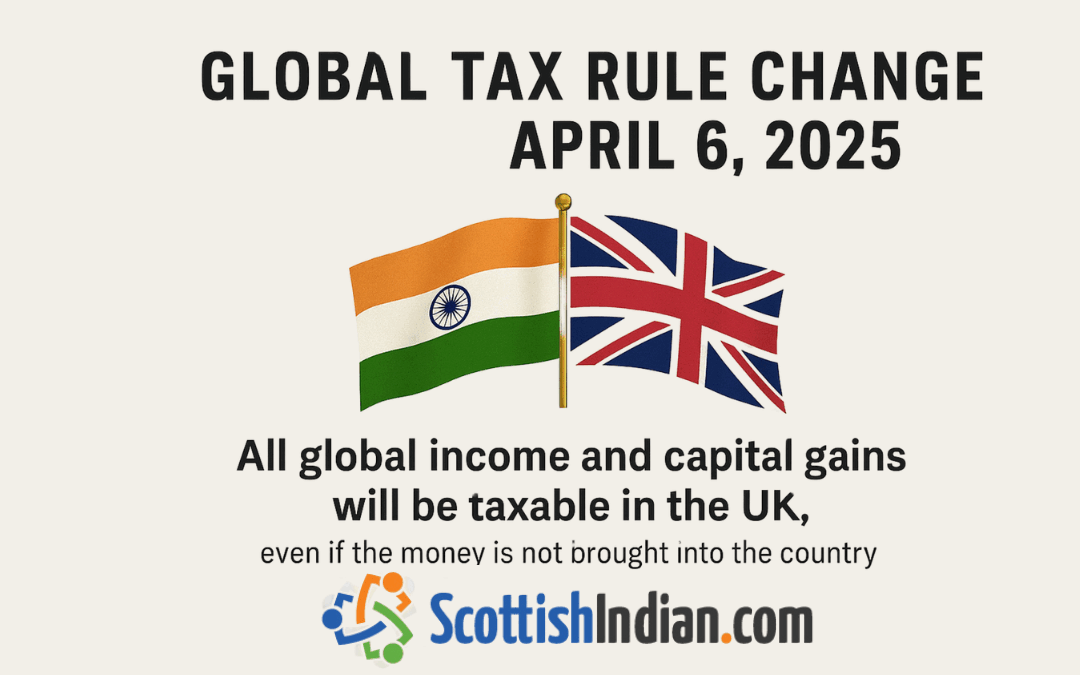
by Soniya Basu | Jun 3, 2025 | 2025 Changes, Awareness
If you’re a UK tax resident with income or assets abroad, especially in India — this one’s for you.
If you’re a UK resident with earnings in India, you need to prepare for the UK tax on Indian income starting April 6, 2025. This new tax regulation means all global income—whether it’s rent from property, dividends, or capital gains from India—will be taxable in the UK, even if it’s not brought into the country. Here’s what you need to know to stay compliant and avoid surprises.
What the UK Tax on Indian Income Means for You
This change impacts a wide range of income types and financial situations. Here’s a breakdown:
1. Indian Income Will Be Taxable
If you’re earning:
- Rent from Indian property
- Dividends from Indian shares
- Capital gains from selling land, shares, or businesses in India
…then you’ll now have to declare and potentially pay tax on this income in the UK.
2. Offshore Business Income Affects UK Tax on Indian Income
If you hold:
- Foreign bank accounts, or
- Shares in a business registered outside the UK
These will now be under the UK tax lens too.
3. Indian NRIs Living in the UK
Even if you’re a Non-Resident Indian (NRI) for Indian tax purposes, your UK residency status overrides that when it comes to UK taxes.
If you live in the UK and have global income, you’ll be taxed on all of it under the new rules.
UK Ends Remittance Basis—What That Means for Taxing Indian Income
Previously, UK tax residents who were non-domiciled (non-doms) could opt to pay UK tax only on income and gains they remitted (brought) into the UK.
That’s over.
From April 2025 onwards, the UK will follow a worldwide income taxation model for all residents.
What You Need to Do
🔁 Avoid Double Taxation with the India–UK DTAA
The Double Taxation Avoidance Agreement (DTAA) between India and the UK is your safety net. This ensures you don’t pay tax twice on the same income.
➡️ For example, if you’ve paid tax on rental income in India, you may be able to claim a credit for that in the UK.
But this doesn’t happen automatically—you’ll need to report and apply properly.
Know Your Reliefs and Exemptions
There may still be personal allowances, foreign income exemptions, or reliefs available depending on:
- How long you’ve lived in the UK
- Your tax residency status
- Type of income involved
Speak to a qualified tax advisor to take action from April 2025.
Key Takeaways
- Global income = UK taxable income (started on April 6, 2025)
- Indian earnings like rent, capital gains, and dividends will be taxed
- Offshore accounts, businesses, and assets are in scope
- The remittance basis is gone
- Use the India–UK DTAA to prevent double taxation
Read more about the India–UK DTAA on the Indian Income Tax Department site.
- Act now to understand your reliefs and obligations
Don’t wait until April 2025 to react—get ahead, get informed, and get your global tax affairs in order.
“Learn more about your UK residency status and how it affects your obligations in our Visa & Immigration section.”
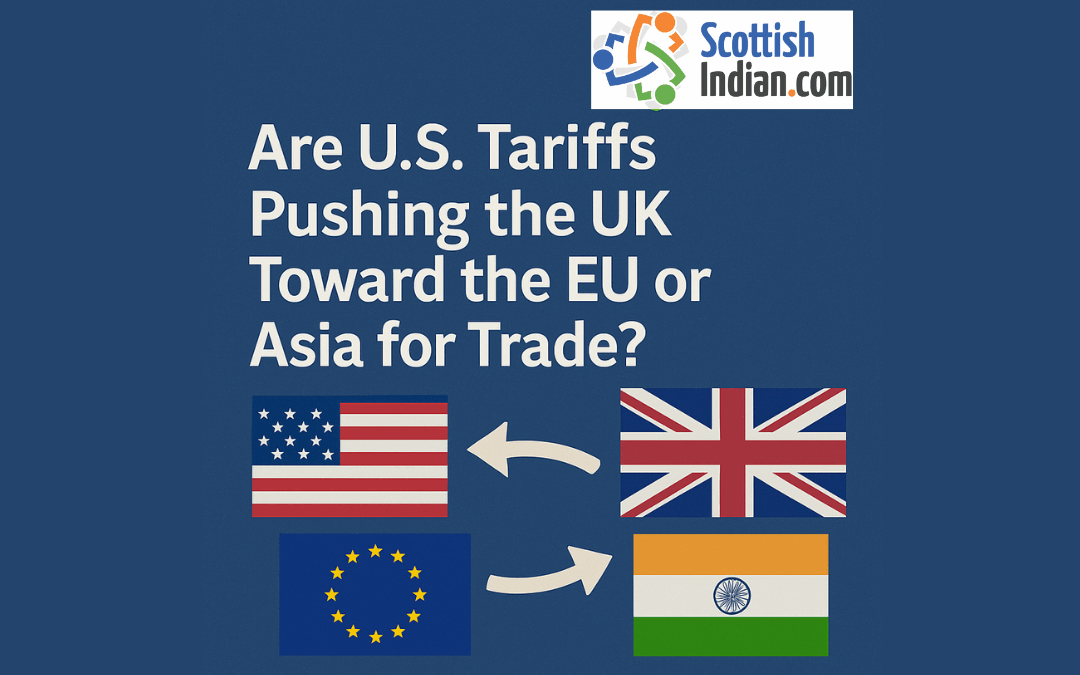
by Soniya Basu | May 29, 2025 | 2025 Changes, Awareness
Let’s be real—global trade might not be the sexiest topic out there, but it totally affects your everyday life. From phone prices to food on your shelf, trade deals and tariffs shape more than we think. With new policies in place, US tariffs are now impacting UK trade directly—forcing the UK to rethink its global strategy.(BBC Business, Financial Times)
Lately, there’s been some serious tension between the UK and the U.S., especially with new tariffs popping up like unwanted ads. So now the UK has a bit of a dilemma: should it stick closer to the EU or look toward Asia for future trade?
At ScottishIndian.com, we’re all about bridging cultures, sharing stories, and helping our community navigate global shifts—especially when they hit close to home.
US Tariffs and Their Impact on UK Trade in 2025
Recently, the United States has been increasing tariffs on imports from countries like the UK. This means higher taxes on goods like steel, green tech, and even certain luxury items. For British businesses, that makes it harder to stay competitive in the American market. Products cost more. Sales drop.
And for people in the Scottish Indian community trying to grow international businesses or stay connected across borders, it creates friction. Whether you are importing ingredients, exporting handmade products, or running a startup with overseas clients, this stuff matters.The UK is already making moves by signing deals with several Asian countries—see the full list of UK trade agreements—and warming up for a big partnership with India.
Time to Swipe Right on Asia or Europe?
Because of all this tariff drama, the UK is rethinking its trade priorities. One option? Looking East—toward Asia.
And honestly, it’s not a bad idea. Countries like India, Japan, Vietnam, and Singapore are growing fast and hungry for international trade. The UK is already making moves by signing deals with several Asian countries—see the full list of UK trade agreements—and warming up for a big partnership with India.
For our Scottish Indian community, this is kind of the sweet spot. Whether you’re an entrepreneur blending two cultures, or someone who’s got family in both continents, stronger UK-Asia trade ties could open up huge doors. Imagine your UK-based clothing brand suddenly popping off in Delhi or your Glasgow startup landing customers in Singapore. That’s the level-up we’re talking about.
Even though Brexit happened, Europe is still right next door. It is a massive market with shared history and easy logistics. Rebuilding stronger ties with the EU could also give UK businesses a sense of stability and simpler trading rules.
It is not about choosing one over the other. It is about finding a smart balance.
Why You Should Care (Even If You’re Not Into Politics)
Trade decisions might sound like politics, but they shape real opportunities. They impact job markets, what products show up in your feed, and where you can grow your side hustle or startup.
At ScottishIndian.com, we are watching this space closely because our community lives at the intersection of these worlds. We are global thinkers, culture lovers, and change makers. And we believe knowing where the UK is heading helps all of us plan, grow, and connect better. Stay updated on topics like this by visiting our Community Blog or signing up for the newsletter.
Stick with us for more updates that blend world news, culture, and community. This is ScottishIndian.com — where global meets personal.
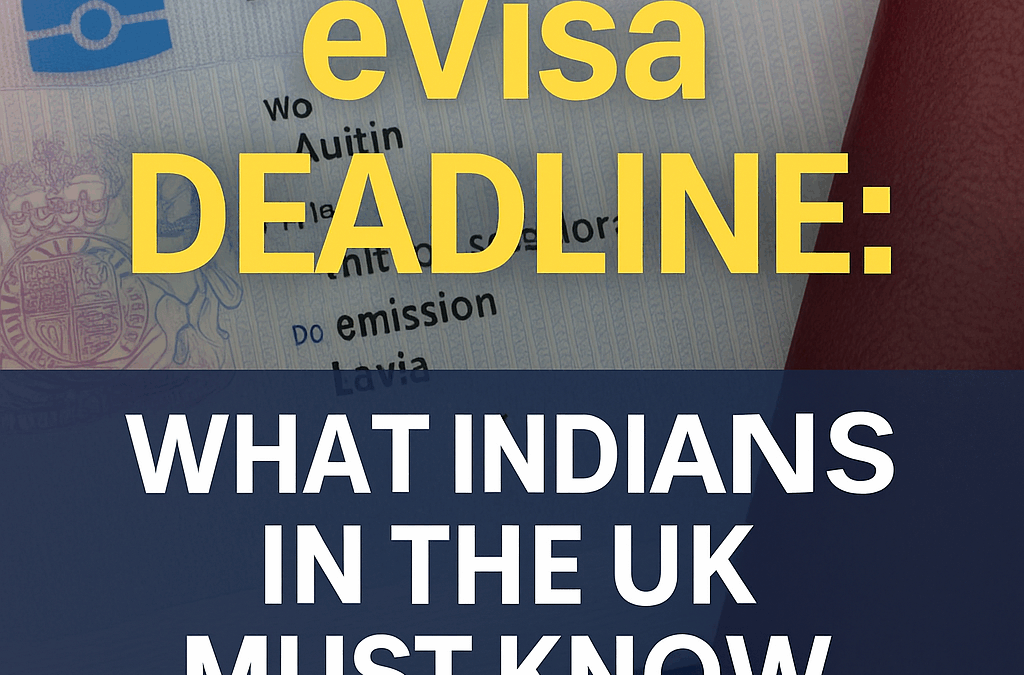
by Soniya Basu | May 28, 2025 | 2025 Changes, Awareness
ScottishIndian.com | Updated for 2025
If you’re an Indian student or migrant living in the UK, here’s an urgent update you can’t afford to miss. The UK government has set 1st June 2025 as the deadline to register for your digital eVisa — a major shift as Biometric Residence Permits (BRPs) are being phased out.
At ScottishIndian.com, we know how overwhelming visa and immigration updates can feel. So we’ve simplified everything you need to know to stay compliant and avoid disruptions to your life, studies, and travel.
What Is the UK eVisa?
The UK eVisa is a digital proof of your immigration status. Unlike the physical BRP card, your immigration info will now be stored electronically and accessed online. You can log in to the UKVI View and Prove service to:
- View your visa status
- Share details with employers or landlords
- Update personal info like passport numbers
Why the eVisa Deadline UK 2025 Is Crucial for Indians in the UK
From 1st June 2025, your BRP card will no longer be valid — even if the expiry date says otherwise. If you haven’t registered for your eVisa, you could:
- Lose access to essential services like renting a flat
- Be denied employment offers
- Face problems with re-entering the UK
- Miss out on NHS services or banking
Simply put, your immigration identity in the UK is going fully digital — and you need to act before the deadline.
How to Register for Your UK eVisa Before the 1 June 2025 Deadline
✅ Step 1: Create or Sign in to Your UKVI Account
- Go to the official website: www.gov.uk/evisa
- Click “Sign in or create an account”
- Use a personal email (not your university email) so you don’t lose access in the future
- Set a secure password
✅ Step 2: Verify Your Identity
You’ll need to prove who you are. You can do this in two ways:
Option A: Using the UK Immigration: ID Check app
- Download the app on your smartphone (iOS or Android)
- Scan your BRP card and valid passport
- Follow the prompts to verify your identity
Option B: Manual Upload (if app doesn’t work)
- Upload digital copies of your BRP and passport on the UKVI portal
- You may be contacted for further verification
✅ Step 3: Link Your BRP to Your UKVI Account
- After verification, ensure your BRP details and passport number are correctly added
- Update your contact information (phone, current address in the UK, etc.)
✅ Step 4: Check and Save Your eVisa
Once submitted and approved:
- You’ll receive a confirmation email
- Log in to your account at any time to view, download, or share your eVisa
- You can now use this record to prove your right to live, work, and rent in the UK
💡 Pro Tip from ScottishIndian: Use a strong email address that you’ll have long-term access to. Avoid student emails that may deactivate after graduation.
💡 Bonus Tips from ScottishIndian.com
- Update your passport: If you renew your passport later, be sure to update your eVisa profile
- Use ‘View and Prove’ tool to share your immigration status with employers or landlords:
👉 gov.uk/view-prove-immigration-status
- Register before 1 June 2025 to avoid any loss of rights or disruptions
Missing the eVisa Deadline UK 2025 – What’s at Risk
Not registering by 1st June 2025 could mean serious consequences:
- Losing the legal ability to work
- Trouble renting property or opening bank accounts
- Risk of being flagged at UK borders or airports
We strongly urge our community to complete their eVisa registration before 1st June 2025. This shift to a digital visa is a step towards modernising the UK’s immigration system — but only if you’re on board.
Need more help? Browse our Visa & Immigration section or follow us on Instagram @scottishindian for real-time updates.
Quick Links:
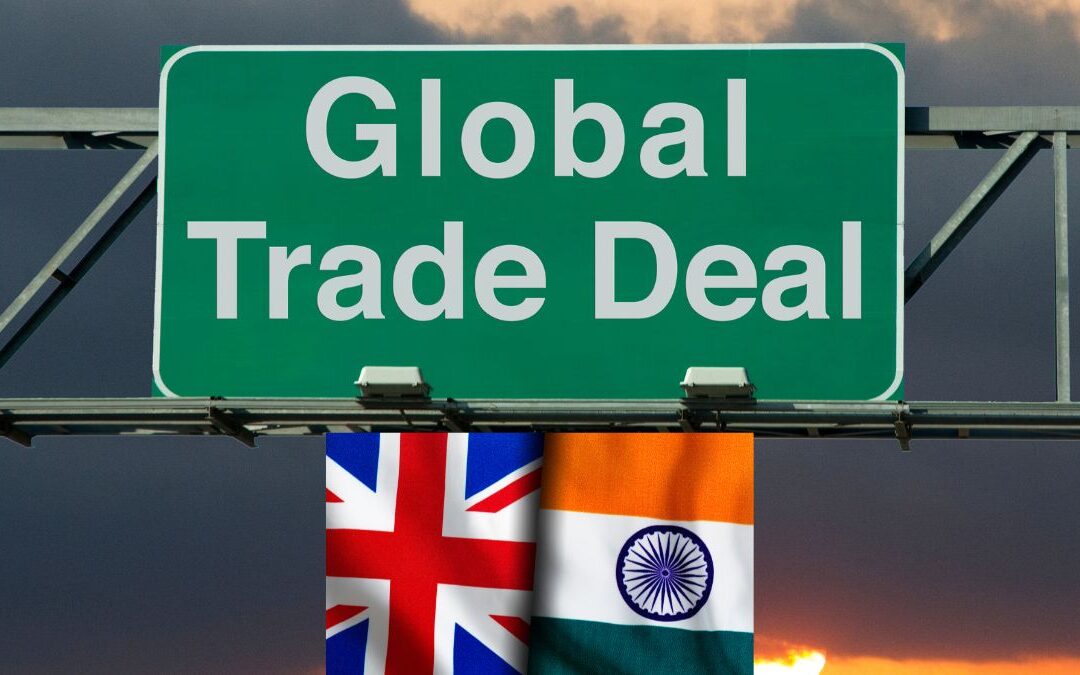
by Soniya Basu | May 19, 2025 | 2025 Changes, Awareness
“Delivering for Britain” — that’s how Keir Starmer describes his recent diplomatic achievements, including the landmark UK-India Trade Deal for Indians in the UK. This new agreement could reshape opportunities for entrepreneurs, students, and professionals across the British Indian community.
In just two weeks, Starmer has announced three key global deals — with India, the US, and the EU — signaling a bold step forward for post-Brexit Britain.
🤝 UK-India Deal: A Key Step Toward Closer Economic Ties
Starmer’s mention of a UK-India agreement highlights growing momentum in strengthening trade, technology, and mobility partnerships between the two nations. While full details remain under wraps, such agreements are expected to:
- Simplify trade pathways for UK-based Indian businesses
- Boost cooperation in sectors like tech, pharmaceuticals, and education
- Improve student mobility and work visa access
- Encourage cultural and business exchange between Indian states and UK cities
This is especially relevant for the Scottish Indian diaspora, many of whom are entrepreneurs, academics, and professionals working across both countries.
🌐 UK-US and UK-EU: Rebuilding Global Bridges
The other two deals — with the United States and the European Union — show a commitment to reposition the UK as a flexible but focused global player. After years of Brexit turbulence, this signals a return to stable, forward-thinking international relationships.
For multicultural communities, especially those engaged in cross-border work, trade, and education, this could lead to:
- Increased business confidence
- Easier cross-border movement for professionals
- Stronger academic and tech collaborations
🗣️ Impact of UK-India Trade Deal on Indians in the UK
For British Indians, and especially for younger generations and dual-identity professionals, Starmer’s international focus opens up opportunities in:
- Global mobility and study
- Small business growth and international scaling
- Cultural partnerships and soft diplomacy
Whether you’re a student eyeing opportunities in both India and the UK, or a business owner exporting goods between continents, these moves could signal greater flexibility, access, and ambition for people like you.
Smart Diplomacy or Early Campaigning?
While some view these announcements as strategic diplomacy, others may see them as the early steps of Labour’s general election narrative. Either way, Keir Starmer is positioning himself — and Britain — as open for global business once again.
Time will tell how deeply these agreements reshape real-world outcomes, but for now, the message is clear: The UK is reconnecting — and fast.
Stay tuned on ScottishIndian.com for updates on UK-India relations, immigration reforms, and opportunities for the South Asian diaspora across the UK.
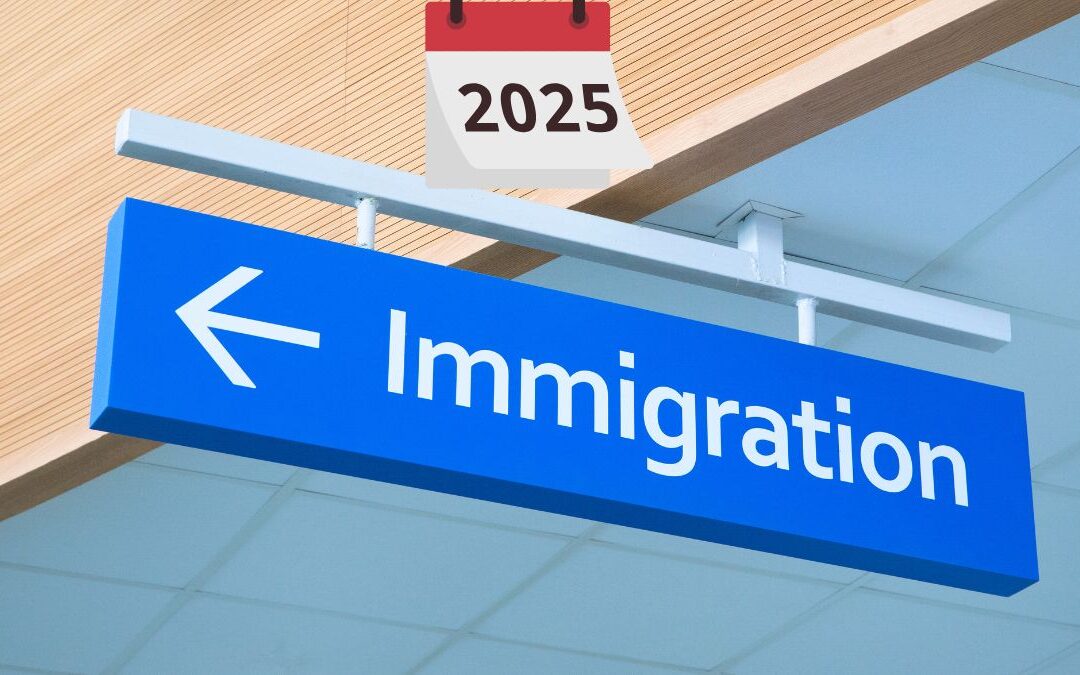
by Soniya Basu | May 13, 2025 | 2025 Changes, Awareness
(A simple guide for Indian students, workers, and families in the UK)
If you’re living in the UK or planning to move soon, you’ve probably heard about changes to immigration rules in 2025. These new rules set-up came from something called the UK Immigration White Paper — and it’s a proposal for now.
At ScottishIndian.com, we’re here to help Indian students, professionals, and families in the UK understand what’s going on — in simple words.
Let’s compare the old system vs. the new rules in 2025 so you know what to expect.
Before 2025: What Was the System Like?
Before 2025, the UK had a points-based system. You could move to the UK if you:
- Got a job that paid enough
- Spoke English well
- Had a student or Skilled Worker visa
Key features:
- Graduate Visa: Let students stay for 2 years after their degree
- Family Visa: Easier to bring your spouse or kids
- Care Worker Visa: Allowed people to work in UK healthcare jobs
- You could apply for citizenship after 5 years in most cases
Many Indian migrants used these routes to study, work, or settle with their families.
After 2025: What Changed in UK Immigration System ?
The 2025 White Paper brought in stricter rules. Here’s what’s different now:
- Citizenship takes longer
- You now need to live in the UK for 10 years before applying (was 5 before).
- Graduate Visa is shorter
- You only get 18 months to stay and find work after graduation (was 2 years).
- Skilled Worker rules are tougher
- You need a graduate-level job
- The minimum salary is higher
- Care Worker Visa will end by 2028
- The UK wants to hire more local workers instead
- Employers pay more
- Businesses must pay higher visa fees to hire international staff
- Stricter English tests
- Both the main applicant and family members need to pass higher-level English exams
What Does This Mean for You?
For our Scottish Indian community:
- If you’re a student, plan early — start job hunting before your course ends
- If you’re a professional, check if your job still qualifies for a visa
- If you’re applying with family, you’ll need to meet higher salary and language rules
Don’t worry — there’s still a path to success. Just be prepared!
📩 Got questions about the proposal of UK Immigration System After 2025? Visit our Whatsapp community. You’re not alone — we’re here to help!
Stay informed. Stay ready. Stay supported — with ScottishIndian.com





